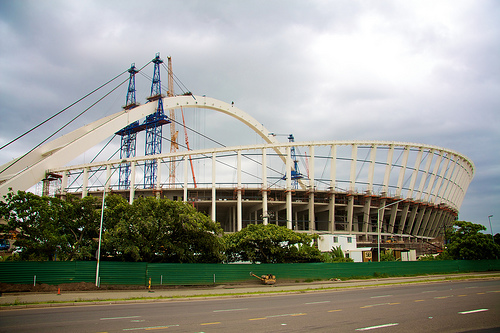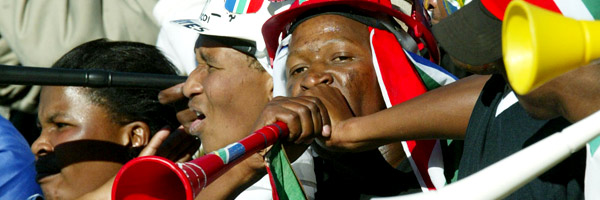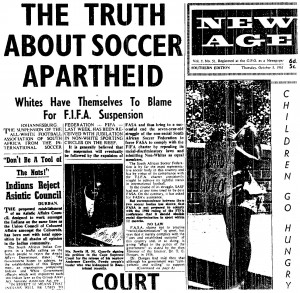FIFA’s suspension of South Africa from world football in September 1961 was one of the first international indictments of apartheid. Click here to read a recent piece on this major event in The Financial Times of London. It is a powerful example of how Africans accelerated the democratization of football and made the game more fully global.
Category: Hosting
Christopher Merrett

Football is often described as the “beautiful game”. Indeed, it is. As Michael Worsnip pointed out recently (The Witness, June 12), football on the local recreation ground reduces the possibility that young people will be tempted into crime. And, of course, South Africa will host a successful Fifa World Cup next year — if it tries hard enough. All of this is obvious. But what is crucially missing from public debate are a number of awkward political, economic and social questions.
New documentary on 2010 World Cup
Trailer for Fahrenheit 2010 – Warming Up for the World Cup in South Africa on TrailerAddict.
FAHRENHEIT 2010: WARMING UP FOR THE WORLD CUP IN SOUTH AFRICA
directed by Craig Tanner, Australia/South Africa (2009) documentary
The measured Fahrenheit 2010 systematically examines the expectations of a variety of South Africans on the country’s staging of the 2010 FIFA World Cup. Focal points of the film are South Africa’s socio-economic disparities and debate as to whether the erection of state of the art sports arenas will leave the country with white elephants which it can ill afford. Interviewees include Danny Jordaan, Desmond Tutu, Michael Sutcliffe, Jomo Sono, Dennis Brutus and also, amongst others, construction workers, street traders, soccer players and the sangoma with the answer to Bafana Bafana’s woes.
White elephants?
Report in the South African newspaper, The Mercury
THE fate of some of South Africa’s oldest stadiums, including Durban’s
Absa Stadium, is already decided, despite the emotional debate expected
to rage around the continued existence of these venues.
Danny Jordaan, CEO of Fifa’s 2010 Local Organising committee, said at
the African Journalism Awards 2010 media debate in Durban on Friday,
that a decision to demolish the Boet Erasmus stadium in Port Elizabeth
had already been taken and that both Newlands and the Absa stadium in
Durban would share the same fate in time.
Responding to a question on whether the new stadiums would be white
elephants once the World Cup was over, Jordaan said the lifecycle of any
stadium was 50 to 70 years and that Newlands and the Absa stadium were
reaching their sell-by date.
“This is an emotional debate that will go on for a long time, but who,
once they have experienced the new, modern, sophisticated stadiums will
want to go back to the old ones? South Africa has made a bid to host the
Rugby World Cup in 2015 and if we win that, the games will most
certainly be hosted in the new stadiums. If that happened it would
certainly help to move this debate along,” he said.
Sharks rugby CEO Brian van Zyl said the issue hadn’t been raised with him.
“That’s the first I’ve heard of it and it’s absolute nonsense? Jordaan’s
opinion of Absa is subjective. In any case, we have made a promise to
all our stakeholders that before we make any decisions regarding this
stadium we will consult with them through a transparent process. To
date, the indication from many of them is they don’t want to move – I
guess it could be considered an emotive issue, but it’s about a culture.”
Van Zyl said according to clause six of the South African Rugby Union’s
constitution all international rugby matches, including the World Cup,
would be played at rugby venues. “And I don’t think that’s about to change.”
Western Province Rugby Union’s managing director, Rob Wagner, said it
was also the first he had heard of it.
“We own the stadium, there is no debt on it and it’s probably one of the
oldest rugby grounds in the world. It has heritage and tradition, why
would we want to demolish it? I can’t understand how Jordaan could have
said that.”
ESPN’s Outside the Lines sent its presenter, Bob Ley, to South Africa to report on the preparations for the World Cup. It is an informative, fair piece in stark contrast with the nonsense published in the UK press, including in The Guardian. You can watch the rest of the report at the program’s website (scroll down and look on the right).

The weekly news and business magazine, The Economistpublished a story this week on South Africa’s preparations for next year’s World Cup. The magazine, not known for singing South Africa’s praises, not only concluded that South Africa is on track and that “… the doubters are so far being proved wrong.”
When, in 2004, South Africa was chosen to be the first African country to host football’s World Cup many fans around the world were doubtful. South Africa would mismanage it, they said. It would be a commercial flop. They mooted Australia as an alternative should South Africa’s organisers fail to get their act together. Five years on, the doubts have diminished as new stadiums rise up across the country. Indeed, next year’s tournament may turn out to be the most profitable yet, thanks to the sale of broadcasting rights …
FIFA denied my request for tickets so I followed the Confederations Cup from home. I drew on my observations from afar as well as media coverage and conversations with friends in South Africa to learn these five things from the tournament:
1. This beautiful yet scarred country will host an eventful World Cup next year. The stadiums are nice and the climate in different cities may surprise visitors. Also, the difficulties with transport, accommodation, communications, and moving people to the stadiums may be mitigated by next year but are not likely to disappear.
2. The Confed Cup is not a terribly interesting competition. It features too many marginal sides (New Zealand, Iraq, South Africa) and tired European giants (Spain and Italy). No wonder we had to depend on the depth and individual brilliance of Brazil and the do-or-die attitude of the improving USA for entertainment.
3. Despite what the organizers tell us, the vuvuzelas are not part of South Africa’s ‘traditional’ fan culture. The horns appeared in the mid-1990s and did not become widespread until a few years ago. And they were ‘invented’ by a white guy.
4. The trend of the past decade that saw raw speed and set pieces decide so many matches will probably continue in 2010. Given the heavy-handed emphasis on defensive tactics, the pace of players like Kaka’ offers precious opportunities to burst through defensive walls and exploit open space on counter-attacks. Corners and free kicks are key, just ask the USA and South Africa.
5. The 2010 World Cup is a huge national project aimed at enhancing ‘Brand South Africa’ — the image of the country as a modern, democratic, business-friendly, tourist destination. Football-crazy South Africans legitimize this political and economic agenda, even though they pay billions to host the event while FIFA keeps most of the financial profits.
